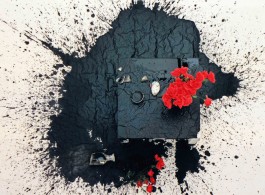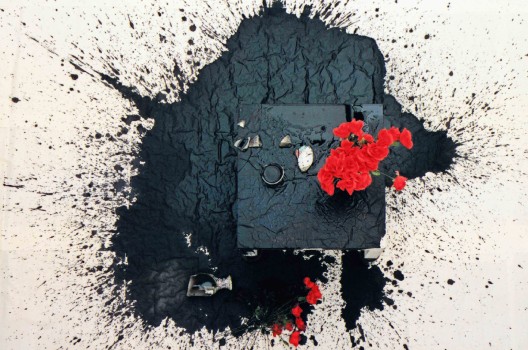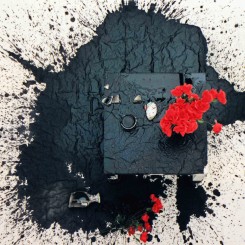Ink Studio, Beijing
Opening on September 10, 2017 at Ink Studio, Making Traces: The Arts of Participation and Refusal is the first conceptual retrospective of China’s seminal ink performance artist Dai Guangyu’s performance art practice. The exhibition is curated by Maya Kóvskaya, PhD.
Dai Guangyu first came to prominence as a leader of China’s ‘85 New Wave movement in southwestern China and has devoted his career to exploring the possibilities of ink and performance art. Making Traces conceptually explores the trajectory of this more than 30-year practice and unveils new works in his vibrant public, political and participatory performance art oeuvre. The exhibition also displays for the first time a pivotal body of historically groundbreaking performance art artifacts that augment the photography and video documentation typically associated with performance art. These “performance artifacts” are significant artworks in themselves and reveal the dynamics and critical stances of refusal and resistance embodied in Dai Guangyu’s work.
As the most important performance artist in China who uses ink as a mainstay of his practice, Dai Guangyu stands out both among his peers domestically and among other prominent performance artists internationally. For over thirty years Dai Guangyu has been using ink in his performance art practice in ways that both productively extend and also radically break with thousands of years of art history. Using the unique capacity of ink to make the ephemera of his performances permanent, he activates the trace-making power of ink on surfaces like xuan paper to “transmediate” the vital substance and attitudes of his performance.
Most performance artists transmediate the fleeting moment of a performance into the representational forms that make the performance present again to new audiences by re-presenting it as videos or photographs. Dai Guangyu not only does this, but also does something special with ink that distinguishes him profoundly from the others. Using ink on paper in many of his performances, he captures permanently legible traces of his performance ephemera. This is different in that he does so non-representationally. Ink acts as a performative “index” that captures on paper traces of action and inner states of being, attitudes, stances, orientations and even sometimes interactions without resorting to representation—without depicting the performance. Laden with the indexical meaning of the performances that these traces instantiate, the performance artifacts produced also bear the weight of significance that painting alone cannot, because they index a whole panorama of performative action unfolding over time. This aspect of Dai Guangyu’s ink-based performance art practice puts him in a class of his own, both among Chinese ink painters and also performance artists worldwide.
Ink functions as more than just a “sign” of culture, history, or art, but as a medium that materially mediates the performance. Dai Guangyu’s use of ink, therefore, is an organic extension (to contemporary performance art practice) of ink’s traditional role as visual medium for recording a calligraphic performance—essentially an index of the performance and the artist’s xintai or state of mind/being during the event. Just as a work of calligraphy creates a unique work of art—a unique visual record of a calligraphic performance—so too does Dai Guangyu’s performative use of ink and paper as both signifier and medium create a unique record of a live performance event. Making Traces shares this powerful aspect of his practice with the public for the first time.
Dai Guangyu’s work goes far beyond self-expression, however, routinely invoking a poetic, allegorical mode of performing scenarios that leave audiences questioning relations of truth, morality, ambiguity, responsibility, agency, authority and aesthetics, and performatively enacts these provocations through solo interventions as well as participatory group performances.
Another noteworthy aspect of Dai Guangyu’s rich practice is his long-term commitment to engaged public art and participatory performance art interventions that use a “social sculpture” mode of performance art that engages audiences to “make traces” together through participation.
The opening of the exhibition will feature one such new large-scale participatory performance, entitled And Thus is This Land, in which visitors are invited to co-produce a major piece of artwork, and in doing so consider their own roles in producing the larger picture we all participate in making that is our shared, common life.
In this spirit, Making Traces: The Arts of Participation and Refusal explores the power of Dai Guangyu’s live performances to leave lasting and legible traces that enact, in turn, stances of refusal, resistance, reinterpretation, and offer the possibility of recuperating, reclaiming, and reanimating ways of being in the world that point us towards ways to consider how we, individually and collectively, might better “live in the truth.”
~Maya Kóvskaya, PhD



